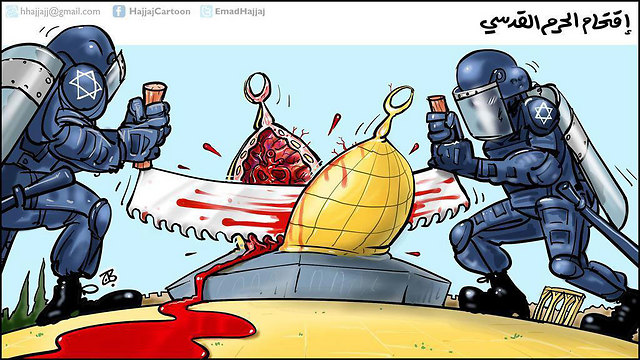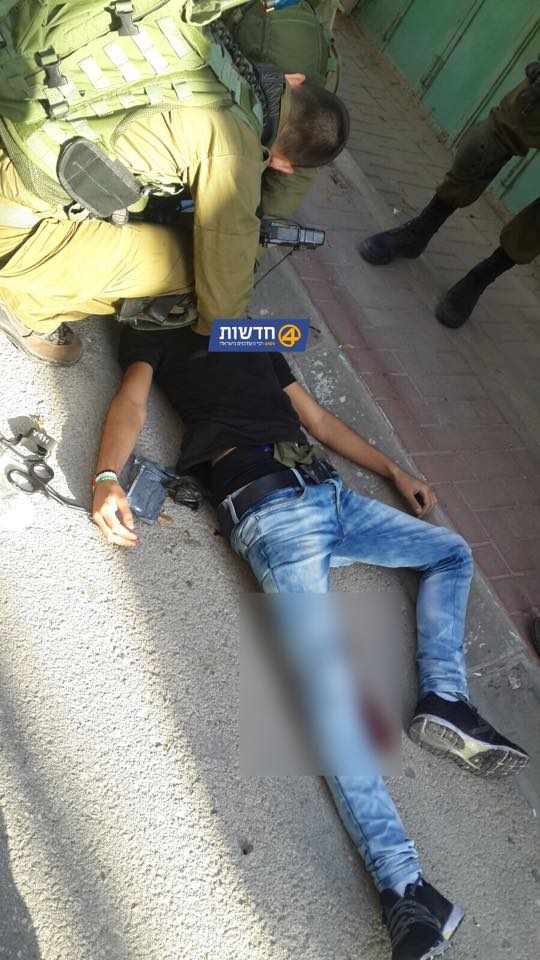
For Palestinians, social media takes center stage
The dozens of newspapers, TV channels and radio stations reporting on the latest bout of Israel-Palestinian violence are background noise for Palestinians, who increasingly rely on social media networks that often break news before the traditional news outlets.
Four dailies, eight TV stations and scores of radio stations report on the current wave of Israeli-Palestinian violence in the Palestinian territories. But they are background noise for many Palestinian youth, whose number one source of news comes from Facebook groups that pump out a minute-by-minute stream of bloody images and pro-violence slogans.
Many Palestinians say such sites only hold up a mirror, or camera, to incessant Israeli violence and pent-up Palestinian fury — that social media reflects reality, not creates it. But Israeli officials argue the medium is the message — that Palestinian social media news sites, some with millions of followers, and the content they post are the driving force in the current wave of violence.

Leaders on both sides have also blamed each other for contributing to violence with their words. Netanyahu accused Palestinian President Mahmoud Abbas of incitement when he made an erroneous claim that Israel had killed a Palestinian teen when he was actually being treated in an Israeli hospital.
The same accusation has been leveled at Netanyahu for speeches linking Abbas to the Islamic State group and suggesting a World War II-era Palestinian leader was the one who persuaded Hitler to exterminate European Jews.
Israeli officials say they convinced Google's YouTube service and Facebook to remove some Palestinian videos and an Israeli legal group is preparing a class-action lawsuit against Facebook to force the site to remove certain pro-Palestinian pages. Facebook in the past has removed some Palestinian news sites, but they simply popped up again under a different guise. Over time, they have become essential sources of news for Palestinians.
The Quds News Network, which operates one of the most prominent Palestinian Facebook news sites, has about 3.7 million Facebook followers and says it relies on a network of some 300 stringers throughout Israel, the West Bank and Gaza. It breaks news so rapidly that it tends to beat out traditional Palestinian media outlets — even providing those outlets with video and photos.
The site says it is independent, but has a reputation for being affiliated with Islamic Jihad, a Palestinian militant group. Another active Facebook site, run by the Shehab News Network, has about 4.2 million followers and is regarded by Palestinians as being linked with Hamas. Both militant groups oppose Israel's right to exist, and have killed scores of Israelis in suicide bombings and shootings over the years.
"Our message is twofold. Number one is to support the resistance; second, expose the aggressive acts of the Israeli occupation," said Ahmed Yousef, 25, an editor at Quds News Network. Sitting in a baklava shop on a recent afternoon, he coordinated coverage with other editors in a Facebook chat group on his cell phone.
Yousef said his site does not encourage violence, but only reflects the attitude of the streets. "During this uprising we have to match the mood of the people," he said.
Israeli social media have also spread graphic images, including security camera footage of attacks released by police.
One popular Israeli Facebook news site, 0404, has a following of about 370,000 and provides a constant feed of news and images, including photos of dead Palestinians after being shot by Israeli forces, though it blurs graphic images. It also praises Israeli soldiers as "our brothers" for thwarting attacks.
But the reach of these sites seems to pale in comparison to the Palestinian Facebook groups, whose audiences dwarf those of more traditional news sources.

The Al-Ayyam daily, a major Palestinian newspaper, estimates its daily readership at about 120,000, while the top TV channel viewed by Palestinians, Al-Jazeera, is seen by about 22 percent of Palestinian adults, according to a survey last month by pollster Khalil Shikaki.
In the first intifada, or uprising, in the 1980s, militant groups called for demonstrations by scrawling announcements on cement walls; today, those calls are made on Facebook walls.
About half of Palestinians in the West Bank and Gaza use the internet, and among young people, the percentages are much higher. Some 1.5 million Palestinians use Facebook. Electronic media, including Facebook and Twitter, are the number one source of news for young Palestinians, said Ghassan Khatib of the Jerusalem Media and Communications Center, a research and polling center.
The recent stabbings and other deadly attacks on Israelis have been largely carried out by Palestinians in their teens and twenties. Many of them have had no record of militant or criminal activity, and some appear to have been influenced by graphic images on social media showing young Palestinians on the ground after being shot by Israeli officers who said they had attempted stabbings.
Relatives of Subhi Abu Khalifeh, a 19-year-old Palestinian accused in a Jerusalem stabbing, say he was outraged over a video showing the shooting of an 18-year-old Palestinian woman by an Israeli civilian after police said she stabbed him. A Palestinian version of events distributed on social media said the man had harassed the teen, trying to remove her headscarf, but she did not stab him.
Yousef, the Quds News Network editor, said the group has developed a devoted network of contributors because stringers who submit footage are paid per submission, and editors guarantee their work will be used. Many Palestinians in recent years have bought video cameras for the supplemental income such sites provide.
The site generates income from advertisements and subscriptions to its text message news alert service. Yousef said it did not receive support from any political or militant faction.
Saed Karzoun, a 30-year-old Palestinian digital media activist who is worried about the influence of recent social media posts, scrolled through the Quds News Network Facebook page on his laptop at his Ramallah apartment. He stopped at a graphic picture of a young Palestinian lying in a pool of blood, shot dead by Israeli forces at a military checkpoint in the West Bank. The military said he had attempted to stab an officer.
"You watch a kid dying. What you will do? You will pick up a knife," said Karzoun. "This is the effect of social media now. This is very dangerous."










